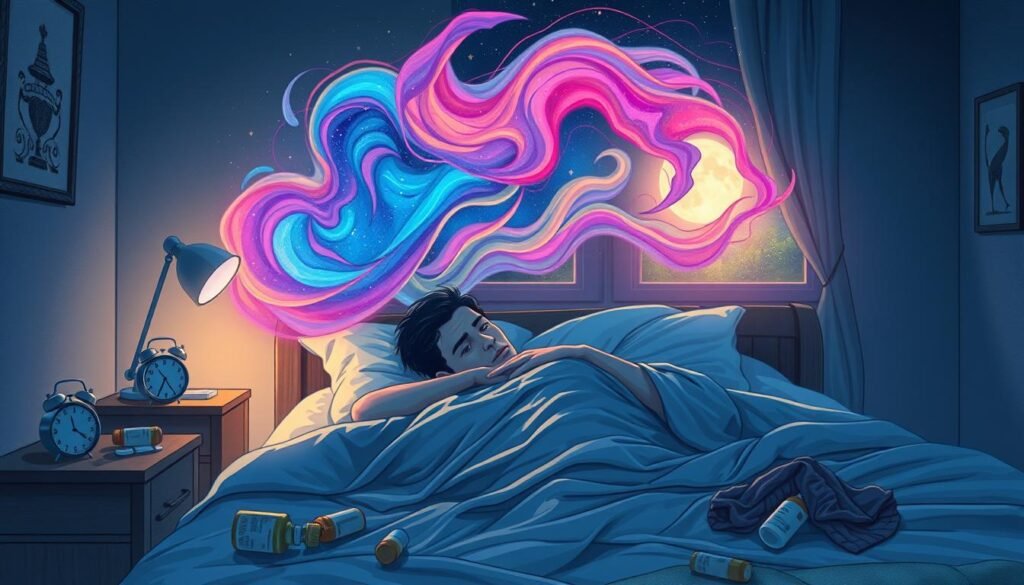Have you ever thought about how a cough suppressant can mess with your sleep? Benzonatate and insomnia have a complex link. Tessalon and other brands offer this medication to stop coughs from illnesses. But, it might cause sleep issues.
Knowing how benzonatate affects sleep is important before using it. We’ll look into how it works, its side effects, and its impact on sleep.
Key Takeaways
- Benzonatate can cause insomnia, affecting sleep quality for some users.
- This medication works as a cough suppressant, starting to take effect within 15–20 minutes.
- Common side effects include drowsiness, dizziness, and nausea, which may influence sleep patterns.
- Understanding the dosage is vital, as adults typically take 100–200 mg three times a day.
- It’s essential to keep benzonatate out of reach of children due to serious risks associated with misuse.
Understanding Benzonatate
Benzonatate, sold as Tessalon, helps manage coughs from respiratory illnesses. It comes in capsules: 100 mg, 150 mg, and 200 mg. It numbs throat and lung receptors. This stops the coughing from colds or flu.
Knowing benzonatate’s side effects is important. You might feel drowsy, dizzy, get headaches, or feel sick. Allergic reactions are rare but can be severe. Swelling and breathing problems need fast doctor’s help.
To use benzonatate right, take 100 mg three times a day. Too much can be very dangerous, especially for kids. This means you must be very careful with the dosage.
Benzonatate won’t make you depend on it. It doesn’t mix badly with food or soft drinks. But, it might affect how other medicines work. Tell doctors about your other meds. For more information, see the Mayo Clinic’s guide.
What is Benzonatate?
Benzonatate is a prescription drug known for helping with cough relief. It is available under the brand name Tessalon and also as a generic. It’s great for those with non-stop coughing. It works by numbing the throat and lungs to stop the cough reflex.

For it to work right, you must swallow it whole—never chew or suck on it. It starts working in 15 to 20 minutes. The relief lasts from 3 to 8 hours, which helps during day or night. But, taking too much or using it wrong can cause bad side effects. These can be serious like trouble breathing or swelling in the throat.
- Drowsiness
- Chest numbness
- Burning eyes
- Confusion
- Hallucinations
It’s important to know the risks of this drug. Adults usually take 100 to 200 mg three times a day. But never more than 600 mg in one day for cough relief. Pregnant women should be careful with benzonatate. It’s a pregnancy Category C drug, which means it might harm the fetus.
For more detailed info on how to use it and side effects, check out this link. Store Benzonatate the right way, at room temp, away from light and moisture to keep it effective.
How Benzonatate Works as a Cough Suppressant
Benzonatate is designed to stop coughs from colds and bronchitis. It numbs the stretch receptors in the bronchial passages. This helps reduce the urge to cough, giving relief from constant coughing during illness.
The effectiveness of benzonatate in stopping coughs is important. It comes in 100 mg, 150 mg, and 200 mg capsules. It’s important to swallow these whole, not chewed. Chewing them could numb the mouth and lead to choking.
Benzonatate may cause drowsiness, dizziness, headaches, and stomach issues. Serious allergic reactions include difficulty breathing and skin rashes. If these occur, get medical help right away. Always discuss your medications with your doctor. For more tips on better sleep, check out this resource.
| Dosage (mg) | Administration Frequency | Common Side Effects |
|---|---|---|
| 100 | 3 times daily | Drowsiness, dizziness, headache |
| 150 | 3 times daily | Nausea, upset stomach, itching |
| 200 | 3 times daily | Constipation, rash, stuffy nose |

Benzonatate Insomnia: What You Should Know
Benzonatate is an antitussive medication that helps with coughs. However, it can affect your health, particularly your sleep quality. Understanding the side effects, like insomnia, and their impact on sleep is crucial.
Common Side Effects of Benzonatate
Users of benzonatate may face several side effects, such as:
- Nausea
- Dizziness
- Headache
- Sedation
- Confusion
- Indigestion
- Constipation
- Stuffy nose
- Burning sensation in the eyes
- Cold or “chilly” sensation
- Numbness in the chest
Although drowsiness may seem helpful at first, it can lead to insomnia. This happens as the effect of the medication decreases, causing restless nights.
Impact on Sleep Patterns
Users might face frequent awakenings and interruptions in their sleep cycle. These issues may show up as:
| Impact on Sleep | Description |
|---|---|
| Increased Night Awakenings | Users may wake up often during the night, which lowers sleep quality. |
| Disturbed Sleep Cycles | Disruptions in sleep stages can cause nights to be unrestful. |
| Prolonged Insomnia | Insomnia might continue even after stopping benzonatate, needing close watch. |
Healthcare providers should pay close attention to patients using benzonatate. This is especially true for those with conditions that insomnia could worsen.

Recognizing Insomnia Symptoms
Spotting signs of insomnia is key to handling it well, especially when taking drugs like benzonatate. Troubles like hard times falling asleep, waking up often, and rising too early matter a lot. They deeply affect one’s well-being.
When sleep issues become frequent, the fallout is more than just feeling tired. It leads to being grumpy during the day and thinking less sharply. For those battling long-term insomnia, constant sleep troubles can harm both home and work life.
Early detection of these symptoms is vital. Knowing what they mean helps people pursue treatments to get better sleep. This improves how they function each day.
| Insomnia Symptoms | Potential Effects |
|---|---|
| Difficulty falling asleep | Emotional distress and fatigue |
| Frequent awakenings | Daytime sleepiness and reduced productivity |
| Waking up too early | Difficulty concentrating and irritability |
| Overall sleep disruptions | Impaired cognitive function |
Treating Insomnia Caused by Benzonatate
Dealing with sleeplessness from benzonatate needs a doctor’s advice. It’s important to talk to healthcare experts. They can check your specific case and suggest ways to sleep better. This might include changing your medicine or trying other treatments to help you sleep.
Consulting with Healthcare Professionals
If benzonatate makes you lose sleep, it’s important to see a healthcare professional. They can suggest different ways to tackle this issue, such as:
- Changing how much benzonatate you take to reduce side effects
- Trying other cough medicines that won’t keep you up at night
- Using therapy that doesn’t involve drugs to improve sleep quality
Alternatives to Benzonatate for Nighttime Cough Relief
There are other ways to calm nighttime coughing without harming your sleep. Some options are:
- Store-bought products that won’t make you sleepy
- Natural remedies like honey or herbal teas, which are calming
- Doctor-prescribed cough medicines that don’t affect sleep
Talking to a healthcare pro is key when choosing how to manage coughing and keep sleeping well. Their know-how helps find a good balance between stopping the cough and avoiding sleep problems. This approach aims for health improvement in every aspect.
| Strategy | Description | Impact on Sleep |
|---|---|---|
| Dosage Adjustment | Changing how much medicine you take with a doctor’s help | May make sleeping easier |
| Alternative Medications | Choosing meds that don’t cause sleepiness | Lowers the chance of sleep loss |
| Natural Remedies | Relaxing options like honey or herbal teas | Helps you relax without making you sleepy |
Best Practices for Sleep Hygiene
It’s crucial to focus on good sleep hygiene, especially if you struggle with insomnia due to medications. Adopting different methods can help you sleep better. We’ll discuss how to improve your sleep space and relax before bed.
Creating a Better Sleep Environment
Having a cozy place to sleep is key for good sleep. Here are some tips to make your bedroom better:
- Optimal Room Temperature: Keep the bedroom cool, ideally between 60-67°F. A cooler room makes it easier to sleep.
- Minimize Light: Block unwanted lights with blackout curtains or shades. This can help you fall asleep faster.
- Reduce Noise: Earplugs or white noise machines can block out sounds. This helps create a quieter sleeping environment.
- Quality Bedding: Choose a comfortable mattress and pillows. They should support good sleep.
Relaxation Techniques Before Bedtime
Add relaxing activities to your bedtime routine to fight insomnia from medication. These actions calm your mind and body at night:
- Reading: Pick a calm book. It should be interesting but not too exciting.
- Meditation: Try mindfulness or guided mediation to ease anxiety and relax.
- Gentle Stretching: Do some light stretching to relax your muscles before bed.
Improving your sleep space and using relaxation methods can boost your sleep hygiene. These steps lead to better, more restoring sleep. This improves your overall health.
Chronic Insomnia Management and Benzonatate
If you’re dealing with chronic insomnia and use benzonatate, you need a solid plan. This plan should include both medical and behavioral strategies. Side effects like sleepiness and dizziness from benzonatate can make things worse. It’s crucial to understand these effects to tackle the problem effectively.
One helpful approach is cognitive-behavioral therapy for insomnia (CBT-I). CBT-I is great because it tackles the root causes of sleep issues. It gives patients tools to sleep better in the long run.
Making changes to your lifestyle is key in fighting chronic insomnia. Things like exercising more and eating better can really help improve your sleep. By combining these actions, you can lessen the negative effects of benzonatate on your sleep.
If you’re looking for more help, the Cleveland Clinic Chronic Cough Clinic is a great resource. They’re all about finding and sharing treatments that work. To get deeper into the subject, especially about chronic cough and how to manage it, check out this article.
Conclusion
The relationship between benzonatate and insomnia is not simple. It shows how benzonatate can affect sleep for some people. While it stops coughing, it may also make it hard to sleep well.
Seeing these side effects is key for anyone taking benzonatate, especially if they already have sleep problems. This is very important to think about.
Since sleep is so important to our health, we must deal with insomnia quickly. Talking to doctors for advice and looking for other cough treatments can help. It’s also good to follow sleep hygiene tips every night, which can reduce the negative impact of benzonatate on sleep.
To sum up, dealing with the effects of benzonatate on sleep needs a smart plan. This plan should include medical advice and changes in daily habits. By focusing on good sleep practices and knowing how benzonatate works with other drugs, people can improve their sleep and health.